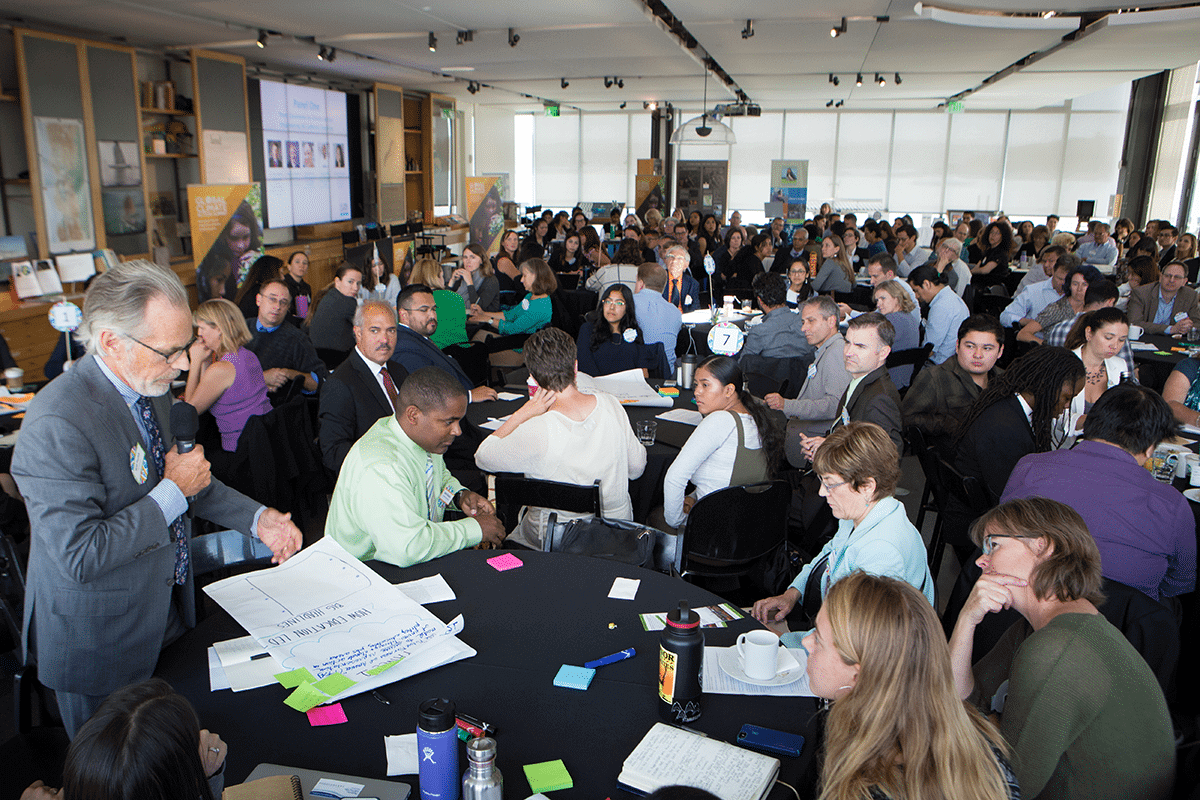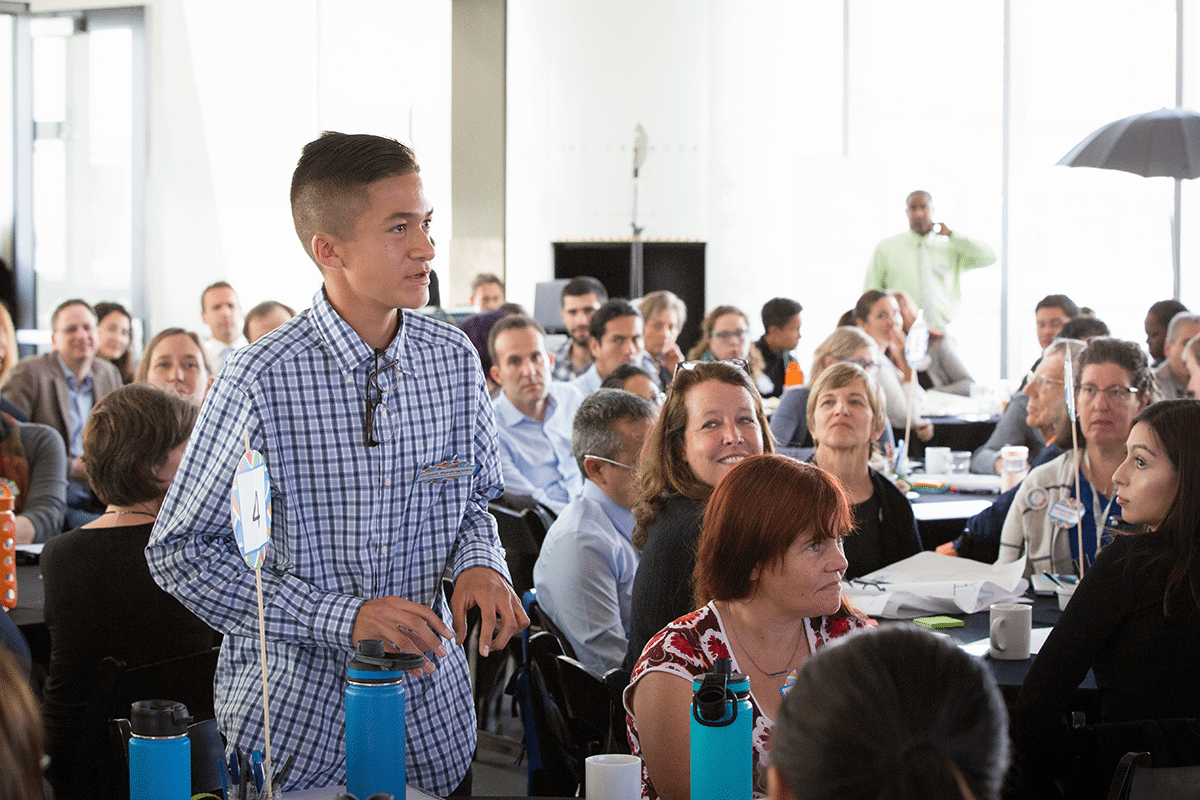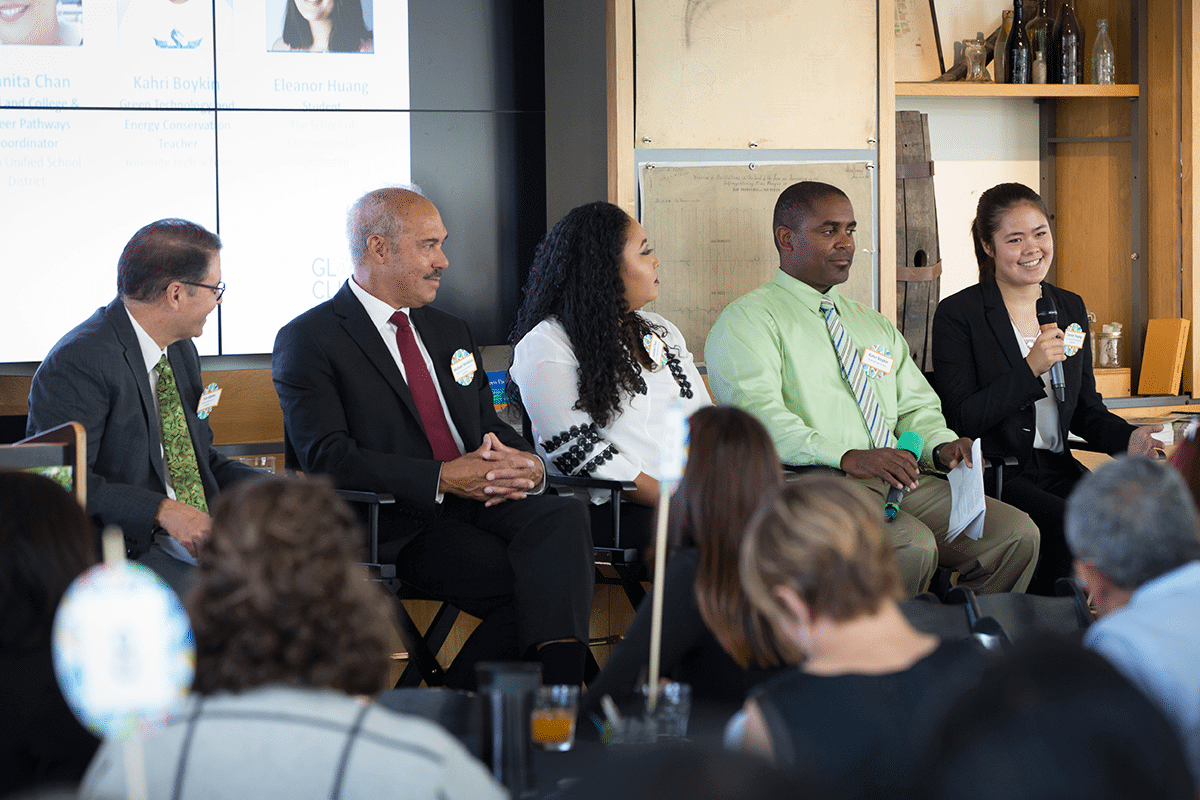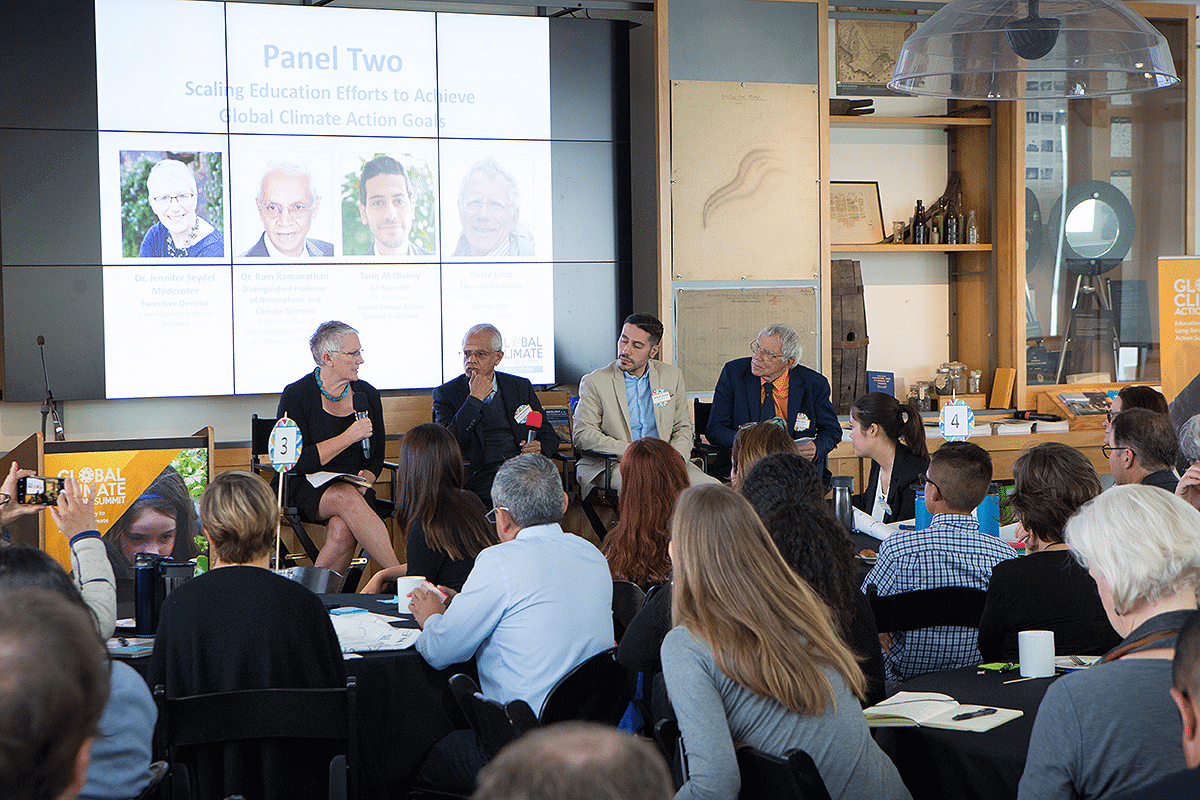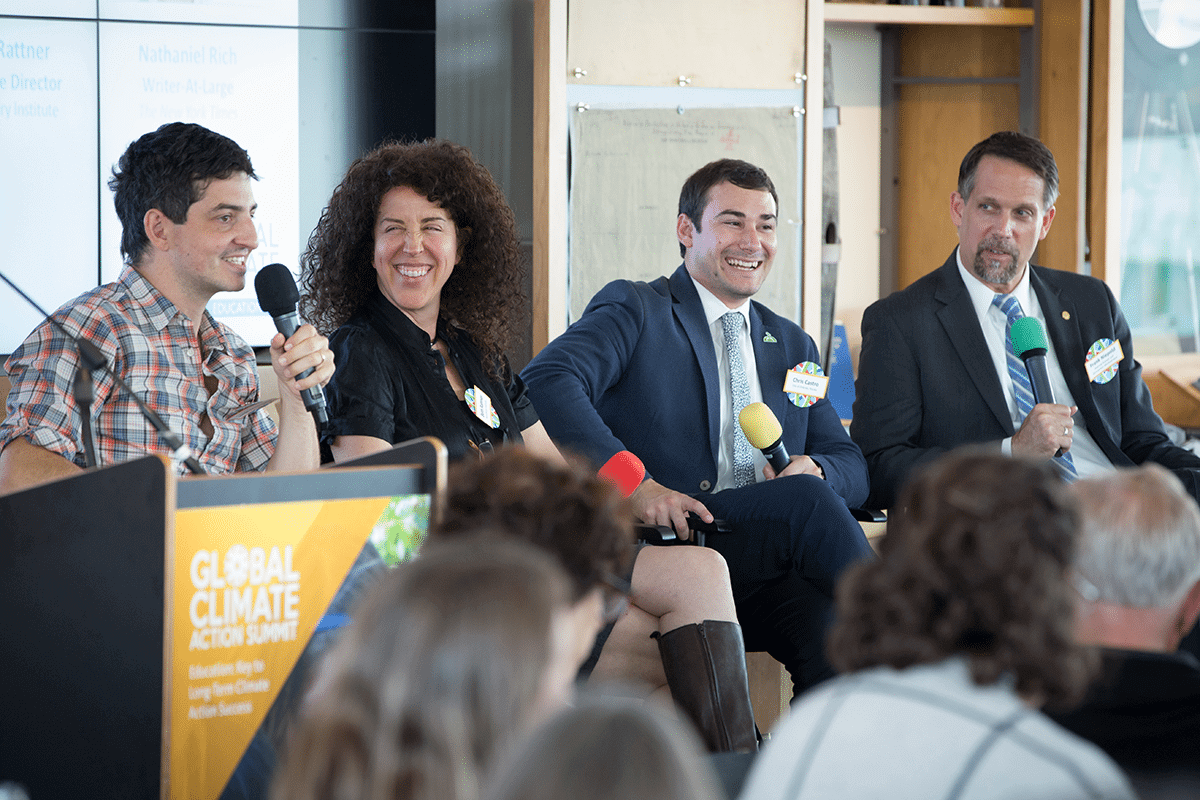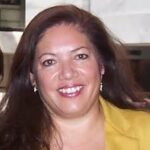September 12, 2018 was a very special day. This was the first day of the unprecedented Global Climate Action Summit, and the official education affiliate event Education: Key to Long-term Climate Action Success at the Exploratorium in San Francisco. The attendees included educators, students, policy makers, and representatives from governmental agencies, nonprofit organizations, businesses, media, and philanthropic organizations. Their challenge? To elevate their commitment to climate education, community engagement, and workforce development.
The day was carefully planned and thoughtfully executed by the event organizers. Recognizing that there was a lot to say, hear, discuss, and consider in addressing the role of education in climate action, participants listened to speakers, panelists, performers, and each other through facilitated conversations throughout the day. To conclude the event, I was asked to provide a summary of our work together on this very special day. I was not exactly sure how to summarize what happened in this room filled with highly motivated individuals engaged in thoughtful and dynamic discussions, but the notes filled with my observations throughout the day provided the answer to my dilemma.
All of you were invited to this event. Some of you probably came here today a little unsure about why you were invited and wondered what the day would offer. But you showed up ready to learn, prepared to engage, and committed to climate action. We started this morning with warm welcomes from Chris Flink, Executive Director of the Exploratorium, and Diana Dooley, Executive Secretary to Governor Jerry Brown, who emphasized the importance of education in addressing climate change. We asked you to participate in discussions throughout the day acknowledging that each person brings important perspectives to the issues and solutions. And you did.
But our participation can go further. We are part of something bigger—part of the Global Climate Action Summit. We are all members of larger organizations, and sit here as representatives who can inform and inspire others through our actions. We can challenge our colleagues, families, students, and communities as the teachers, learners, and activists that we are. Our facilitator Rick Diamond reminded us today that we are all of those things—teachers, learners, and activists. We have been asked as leaders from across sectors to elevate our commitment to climate action, community engagement, and workforce development to drive ambitious, collaborative climate action. Now is the time to do that using what we learned here today.
If I were to create a word cloud from my notes today, this is what you would see: climate education, passion, relevance, youth, care, love, activists, science, entrepreneurs (and intrapreneurs), intergenerational, interdisciplinary, partnerships, social justice, environmental justice, bridges, build, jobs, public policy, climate warriors, climate champions. We heard about and witnessed the power of youth, the importance of teachers, the need for higher education, and the necessity of cross-sector partnerships. We saw opportunities begin to blossom at some of the tables. We also heard that students cannot wait until high school or college or adulthood to learn about and care about the environment.
We learned about Dr. Ram Ramanathan’s goal of one million climate warriors. Whether they are called warriors or champions, we experienced some incredibly hard-working and inspiring climate champions today. They are Chris Flink, Diana Dooley, Terry Tamminen, Maxine Jimenez, Tom Adams, Michael Watkins, Juanita Chan, Khari Boykin, Eleanor Huang, Jennifer Seydel, Ram Ramanathan, Tariq Al-Olaimy, Pierre Lena, Frank Niepold, Chris Castro, Beth Rattner, Nathaniel Rich, Leila Mottley, and Cindy Montanez.
During the first panel, we heard about the importance of leadership and systemic change to foster climate education. Several panelists spoke about the value of science education for all students, and the need for programs that are rigorous, intensive, equitable, and transformed to meet the environmental needs and workforce demands of today. We learned about the vital role of Career Technical Education programs in schools. Juanita shared that once you know something, you care. Her goal is to get people to care about and love their community.
Panel two focused on stories as we learned about taking climate action to scale. We heard from a panel of proud rabble rousers who encouraged us to inspire and support rabble rousers now and in the future. Whether building climate warriors through college courses, bringing a lens on gender or faith to climate issues, insisting on the inclusion of education in national policies, or taking teacher education programs to developing nations, we all have the potential to create our own stories.
In the third panel, we were challenged to think about partnerships—even unlikely partnerships—to address climate action. We now know that we can take action through partnerships with neighbors, nature, and different communities. We can partner across disciplines, in intergenerational settings, and even with those who are incarcerated. There is a clear need for more partnerships dedicated to climate action—effective, respectful partnerships organized with community leaders.
Nathaniel told us that we are not having any conversations today about climate change that we were not having in the 1980s. What could be different today are the actions we take based on these conversations. How do we reach people? Nathaniel suggested a moral appeal. Beth said that trying to get people to do anything is hard. However, she said we need to hold up a larger frame to climate issues because using human-centered design is a problem. She spoke about mobilizing people to make changes and get to a place where all species benefit.
During the day, we heard some great quotes from speakers, panelists, and performers. Here are some quotes that you captured and shared on Twitter at #ElevateClimateEd:
“If we don’t educate the next generation, we won’t get out of this mess and save the planet.”
~ Terry Tamminen
“Stop sugar-coating environmental issues to youth.” ~ Maxine Jimenez
“There is a whole world of information out there in nature.” ~ Beth Rattner
“I have yet to meet a student who knows about these issues and is not motivated to act.”
~ Eleanor Huang
“Climate change is a justice issue beyond any reasonable imagination. We have to put aside our differences.” ~ Ram Ramanathan
“The importance of environmental literacy may be best illustrated by the amount of illiteracy of climate change.” ~ Terry Tamminen
“Young people are so fed up with no seat at the table. We are gonna take our place and bring our own chair.” ~ Maxine Jimenez
“I challenge everyone here to involve and engage youth in everything you do. I don’t know what climate challenges are coming. But I do know that if you give us a chance, my generation can solve them.” ~ Eleanor Huang
“Climate change is the defining crisis of our times. The solutions will come from the kids.”
~ Cindy Montanez
Leila Mottley, a 16-year-old Oakland Youth Poet Laureate, delivered the most impactful performance of the day. She said we need to raise consciousness and challenge the paradigm because “Mother Earth cries while they plug their ears with privilege.” She spoke with force, conviction, and power when she told us, “Mother Earth roars, Mother Earth pounds, Mother Earth cries.”
In the end, we asked each and every one of you to make a commitment to climate action. We hope that you take your commitments seriously and that you share, further develop, and engage partners for those actions. We want you to make those headlines that you imagined for a better future. The time is now to make it happen.

